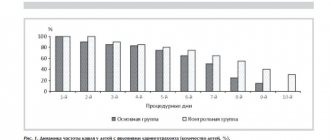The mechanism of the appearance of taste sensations
It is not always easy for even doctors to determine the cause of the taste in the mouth.
Special receptors, mostly located on the papillae of the tongue, are responsible for the sensation of taste in humans. A few receptors are located on the palate and back of the pharynx. All of them are sensitive to several dozen different tastes and their combinations.
Taste sensitivity, like an ear for music, is individual for each person; it can be developed and improved, achieving the ideal taste, like tasters or sommeliers. Despite individual differences, the sensation of the five basic tastes: salty, sweet, sour, bitter, and the taste of meat products is accessible to absolutely everyone.
When a product hits the taste buds, the sensations they receive travel through nerve fibers to the brain. A full sensation and perception of taste is impossible without its combination with smell.
When abnormal sensations such as a metallic taste appear, occurring suddenly, without any apparent connection or cause, it is necessary to find out the etiology of this symptom in order to correct your condition, especially if such sensations occur regularly.
What measures should be taken
To find out the cause, the doctor will prescribe a diagnosis.
Diagnostics
A diagnosis can only be made after a detailed examination. In this case, it becomes clear which diagnostic measures will be used only after an anamnesis has been collected and the patient has been examined.
The most commonly ordered test in this situation is a blood test. The laboratory specialist will need blood from a finger. Using it, employees of a medical organization will determine the level of hemoglobin in the blood, the number of platelets, erythrocytes and leukocytes. Based on this information, we can conclude about the presence or absence of a viral disease or inflammatory processes in the body.
See also
Causes of cough when lying down in an adult, diagnosis and treatment methods
Read
If a general finger blood test reveals pathologies, then an additional biochemical test will certainly be needed. It will reveal chemical indicators of the blood, including how transport proteins move, whether there is enough iron in the blood, and whether the necessary compounds are present. Biochemistry is not always prescribed; it is usually required if serious pathologies are suspected.
If diseases of the respiratory system, including the lungs, are suspected, an x-ray will be prescribed. With its help, you can determine existing dark spots on organs, and with the help of other methods, identify their nature, degree of danger, and the like.
Magnetic resonance or computer tomography is prescribed if previous studies have not revealed a clearly defined pathology. These studies are not always cheap, so ordinary public clinics try to do without them.
If diseases of the respiratory system are excluded, then it is possible that there are problems in the digestive system. The doctor orders an examination of the esophagus or stomach.
An endoscopic tube is used. Ultrasound examination is usually not necessary.
Sometimes the occurrence of a metallic taste in the mouth is associated with a bacterial infection that has settled in the oral cavity or has moved lower into the respiratory system. If this is suspected, then a special culture is taken to identify the causative agent of this infection.
Naturally, in each specific clinical case there will be different diagnostic methods. They are determined depending on the typology of the disease. It is possible that several problems will be identified, but this is extremely rare.
Treatment
Treatment depends entirely on the existing problem, since it is first eliminated, and then the taste will go away on its own. If the problem is anemia, then they try to compensate for the lack of iron, red blood cells and hemoglobin in the body. Not only medications, but also proper nutrition are suitable for this.
A metallic taste caused by poisoning with metal salts indicates a serious danger. It is necessary to immediately intoxicate the body, otherwise there is a risk of death.
For bronchitis, pneumonia, oncology and other diseases, it is important to first start treating them or at least select those groups of drugs that will stop the main symptoms of the disease. They are dealt with only by a physician after conducting a detailed diagnosis and collecting an anamnesis.
External factors causing a metallic taste in the mouth
These reasons may be associated both with the influence of external factors and with physiological changes in the body. For example, metal can be felt when drinking certain brands of mineral water enriched with iron ions. Iron can reach your taste buds through untreated tap water passing through worn and rusty pipes. The solution in this situation is to use a high-quality cleaning filter.
The use of aluminum pots and cast iron cauldrons and frying pans may cause a metallic taste to be added to the traditional taste of food, especially if sour foods were cooked in it. In this case, the metal of the kitchen utensil reacts with food acids, salts are formed, and this is what is felt by the one who tastes this food.
Metal crowns can also cause a metallic taste, especially if they were installed a long time ago. Acidic foods can react with the metal ions in your dentures, creating a faint but very unpleasant taste.
Physiological conditions as a cause of metallic taste
Piercing as a cause of metallic taste in the mouth
If you do not pay enough attention to oral hygiene, you can soon experience this unpleasant symptom. Tartar, bleeding gums, periodontitis, plaque on the teeth and tongue - all these problems affect the appearance of distorted taste sensations.
The use of high-quality toothpaste and mouth rinse, the use of dental floss, and timely sanitation of teeth and gums can eliminate this problem. Hormonal changes in a woman’s life are certainly reflected in changes in the chemical composition of certain environments in her body.
In particular, menopause, pregnancy, and lactation change some positions of the blood formula. This is why sometimes a metallic taste appears in the mouth of women, especially often during pregnancy. Working in hazardous industries, accidents involving exposure to chemical compounds, and unfavorable environmental conditions can cause poisoning, one of the symptoms of which is the taste of metal in the mouth. Mercury, zinc, lead, copper, and arsenic are especially dangerous in this regard.
If poisoning with these chemicals occurs, then the metallic taste is accompanied by symptoms such as:
- Intense thirst.
- Continuous headache.
- Confusion.
- Nausea and vomiting.
- Dizziness.
- Pain in the abdomen and muscles throughout the body.
Without seeking medical help, a person with similar symptoms of poisoning may die or become disabled. A condition that is not as dangerous, but still very unpleasant and also accompanied by a metallic taste in the mouth, can be anemia, or iron deficiency. You can find out about its presence by donating blood for hemoglobin. Anemia can manifest itself with the following symptoms:
- Loss of strength, drowsiness.
- Headaches and dizziness.
- Dry skin, hair, brittle nails.
- Pale skin.
- Cardiopalmus.
- Cracks, or “jams” in the corners of the lips.
- Dry mouth, taste disturbances.
Although there is not enough iron in the body in this condition, it is its taste that becomes a frequent companion to anemia. It can be caused by an unbalanced diet, an increased need for iron compounds during pregnancy and lactation, and rapid growth of children and adolescents.
In addition to iron deficiency, the same reasons can lead to hypovitaminosis - a lack of individual vitamins or their groups. And just as with anemia, the taste of metal in the mouth can be a companion to this condition. Hypovitaminosis may cause irritability, drowsiness or insomnia, and decreased physical and intellectual potential. Taking vitamin complexes and enriching your diet with healthy foods will solve this problem.
Diagnostics
Patients with complaints of iron taste are referred to a general practitioner. To understand why a metallic taste is felt in the mouth, a specialist eliminates the most typical etiological factors. To do this, anamnesis is collected, concomitant diseases and the person’s working conditions are clarified. To make a diagnosis, a set of laboratory and instrumental studies is prescribed, the most informative of which are:
- Blood tests
. A clinical blood test is informative for the diagnosis of various anemias, which are manifested by a decrease in hemoglobin levels, hypochromia of erythrocytes, and the appearance of microcytes or megaloblasts. In a biochemical blood test, attention is paid to the levels of urea and creatinine, an increase in which indicates renal pathology. - Hormonal profile
. Women must have their estrogen and progesterone levels measured on different days of the menstrual cycle, and if their periods are late, they do a hCG test for early detection of pregnancy. To exclude diabetic nephropathy, glucose levels are determined, an oral stress test is performed, and the concentration of insulin in the blood is determined. - Dental examination
. Often, a metallic taste is caused by local causes, so a thorough examination of the mucous membrane, gums and tooth crowns is necessary. During the examination, carious cavities, loose teeth and other signs of periodontal disease are detected. If there are plaques on the mucous membrane, a smear is taken for microscopic examination. - X-ray imaging
. To confirm the renal etiology of unpleasant taste sensations, excretory urography is recommended, which demonstrates the degree of functional activity of the organ and the presence of anatomical defects. When the taste is combined with dyspeptic disorders, radiography of the passage of barium through the gastrointestinal tract is indicated. - Additional methods
. To confirm heavy metal poisoning as the cause of the metallic taste felt in the mouth, a toxicological blood test is prescribed. If bleeding from the upper gastrointestinal tract is suspected, a therapeutic and diagnostic FGDS is performed. If there are atypical behavioral reactions or cognitive impairment, the patient is referred to a neurologist.
Metallic taste is a symptom of disease
A metallic taste in the mouth is a reason to see a doctor.
Diseases of the gastrointestinal tract, in addition to specific symptoms at the location of the pathology, are often accompanied by the appearance of various tastes in the mouth, and a metallic taste is no exception. Most often it accompanies the following diseases:
Alarming symptoms
If you have a metallic taste in your mouth after coughing, you should not panic ahead of time. Only in the aggregate of a number of symptoms can one really become concerned and go to the doctor for further investigation.
You can go to the doctor at any time convenient for you in the following cases:
- You do not experience significant discomfort due to the taste and smell of iron appearing in your mouth. This symptom does not bother you.
- In the event that the oral cavity is visited by the smell of iron only from time to time, also without causing you significant inconvenience.
- If, apart from the unpleasant taste and smell, you do not feel any other symptoms.
Additional manifestations of the disease, such as headaches, weakness, apathy, loss of strength, drowsiness, inadequate skin color, digestive problems, and signs of intoxication, may be a reason for suspicion.
Maybe,
Side effects of medications that affect the appearance of foreign taste
A metallic taste in the mouth may occur while taking medications.
When using a number of medications, a metallic taste may accompany their use, being a side effect of the medications. These are the following groups of drugs:
- Medicines to lower cholesterol levels.
- Medicines used to treat gout.
- Antidiabetic drugs.
- Medicines for the treatment of asthma.
- Antidiabetic drugs.
- Antibiotics.
- Corticosteroids.
- Antihistamines.
- Antifungal drugs.
- Antihistamines.
- Medicines to regulate blood pressure.
In most cases, this taste will cease to be felt with the end of drug therapy, however, this side effect of the drug should be reported to the attending physician.
How to get rid of the problem
If the cause of this is not a symptom of a disease, or a change in physiological state, you can try to eliminate the problem by rinsing with a salt solution (a teaspoon per half liter of water), drinking fruit and vegetable juices. You can chew propolis, ginger root, fresh mint leaves, and add dried spices to drinks.
Brushing your teeth after every meal, using rinses, dental floss for additional cleaning of interdental spaces, brushing your tongue with a special brush - all these measures will help get rid of the unpleasant taste in your mouth. Timely installation and replacement of dentures and dental sanitation can solve the problem.
Treatment
Help before diagnosis
To reduce the metallic taste, it is recommended to carefully monitor hygiene: brush your teeth at least 2 times a day, use a toothpick or dental floss after each meal, and rinse your mouth with water. To overcome the disturbing taste, you can add spices with a strong aroma to food - cinnamon, cardamom, pepper. If there are metal utensils in the house, it is advisable to replace them with glass or ceramic ones.
If you have a strong metallic taste, doctors advise eating a mint candy or a slice of orange and rinsing your mouth with water and lemon juice. You should not use medications uncontrollably, as they often leave a “iron” aftertaste. If taste disturbances are combined with nausea and vomiting, abdominal pain and general malaise, you should seek medical help as soon as possible.
Conservative therapy
The drug treatment regimen is selected depending on the cause of the metallic taste in the mouth. In most cases, etiotropic drugs are prescribed that eliminate the underlying disease, and local rinses are used for local lesions of the oral cavity. The most effective medications are:
- Iron supplements
. Medicines eliminate microelement deficiency in the body and successfully eliminate the manifestations of anemia. The course of treatment is at least 1 month, then iron is taken in low doses for another 2-3 months. For other types of anemia, vitamin B12 and folic acid supplements are recommended. - Antisecretory agents
. They reduce the production of hydrochloric acid in the stomach and normalize digestive function, due to which the metallic taste disappears. The most effective drugs are from the group of proton pump inhibitors; H2-histamine blockers are also used. - Corticosteroids
. Medicines are used to treat renal pathology as a common cause of uncomfortable taste sensations in the mouth. They have a pronounced anti-inflammatory effect, reduce damage to the renal tubules by circulating immune complexes and autoantibodies. - Antibiotics
. The drugs are prescribed for massive bacterial processes in the oral cavity, exacerbation of sinusitis and purulent bronchitis. Antibiotics are taken in tablet form for 7-10 days; for severe pyelonephritis, intravenous administration and a combination of 2 drugs are indicated. - Complexons
. They are chelate compounds that, when ingested, bind and neutralize heavy metals. They must be administered as soon as possible after poisoning. The drugs are combined with massive detoxification therapy with saline and colloid solutions.










